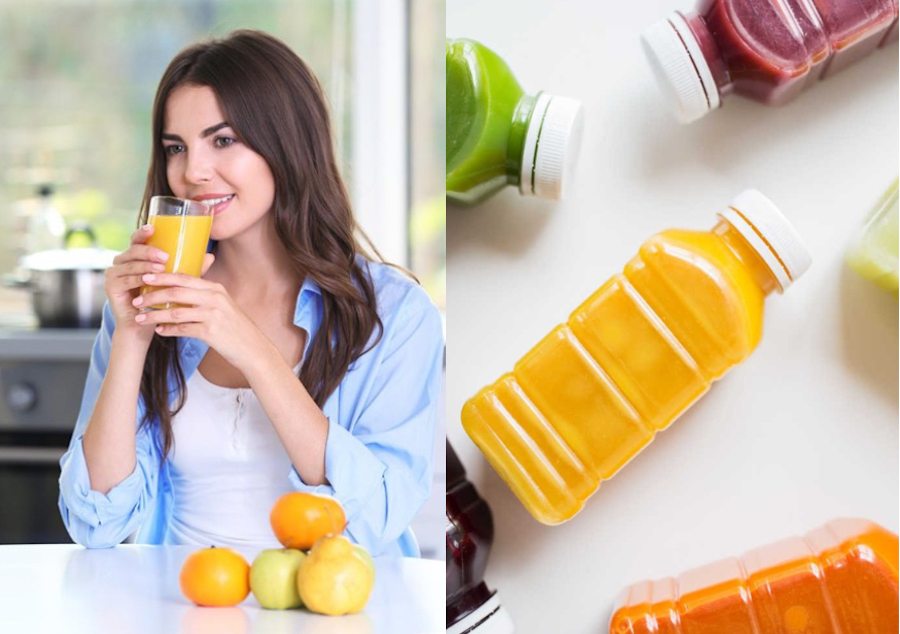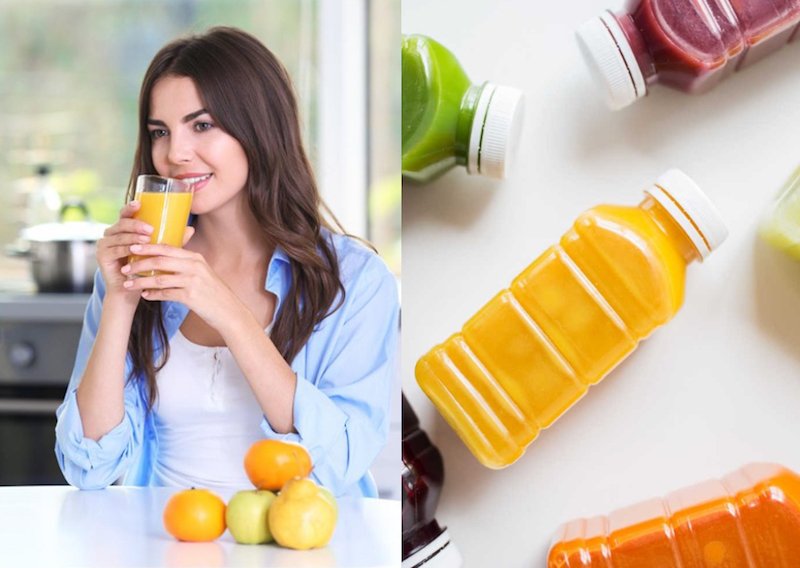Why Should We Stop Having Packaged Fruit Juices?
Fruits are an indispensable part of a healthy diet because they are a rich source of vitamins, minerals, antioxidants, and other nutrients. There’s a small section of individuals out there who have this misconception that fruits may cause weight gain due to their sugar content and a higher calorie content. However, as mentioned above, fruits are generally considered to be a nutritious part of a balanced diet as they provide essential vitamins, minerals, fiber, and antioxidants, which are beneficial for overall health and weight loss as well. Eating fruits like banana, pomegranate, blueberries, strawberries, oranges, watermelon, apple, grapefruit provides essential nutrients, antioxidants, and fiber, supporting weight loss. Antioxidants in fruits combat free radicals and reduce inflammation. Some fruits like guava, kiwi, and pineapple contain minerals like copper, aiding in fat burning. Strawberries, cranberries, and pineapple are good sources of iodine for thyroid function. Vitamin B12 in bananas, apples, and berries boosts metabolism and calorie burning. However, many of us prefer consuming fruits in a juiced form rather than eating them whole. In fact, there’s a strong health halo around fruit juices and it’s a preferred and a more popular way to have fruits. And people who want to improve their health, gravitate towards packaged fruit juices that claim to have been made from 100% real fruits because it’s a convenient way to consume fruits. But do these packaged juices carry the same benefits as fresh juices or real fruits? Let’s find out: But let’s first see what’s the difference between having whole fruits vs juicing them out: Weight Loss Showdown: Whole Fruits vs. Fruit Juice – Which is Superior? Fruit juices, even freshly-squeezed ones, can be high in natural sugars such as fructose and consuming large quantities of fruit juice can lead to rapid spikes in blood sugar levels, which may not be suitable for individuals with diabetes or insulin resistance. When fruits are juiced, the process extracts the liquid, including the sugar, while removing the fiber present in whole fruits. Sugar from the fruits (fructose) is processed by the liver and directly absorbed from the small intestine into the blood. If there’s fiber and phytonutrients (when you have consumed the whole fruit), the absorption of sugar from fruits is slow compared to when you are drinking pure juice. In that case, if your body has already consumed adequate amounts of sugar, all this extra fructose will be basically stored as fat. Additionally, fruit juices tend to be more calorie-dense compared to whole fruits and without the fiber content that provides satiety, it is easier for an individual to consume a larger quantity of fruit juice leading to higher overall calorie intake. As we all know, consuming excess calories would eventually lead to weight gain. Having whole fruits on the other hand promote satiety and you would feel full for longer periods without feeling the urge to eat more food. Also read: “Can you Lose Weight By Drinking Only Fruit Juices?” So, essentially, having fruits in their whole form is far better than juicing them out, i.e., from a weight loss point of view. Talking about fruit juices, as mentioned above, a lot of us pick fruit juices off supermarket aisles to reap all the benefits of real fruits. But this post will throw light on why we should stop having packaged fruit juices. Why Should We Stop Having Packaged Fruit Juices? Now, coming to the main topic, why we should stop having copious amounts of packaged fruit juices to get benefits of real fruits, and why warning bells should be ringing whenever you replace proper meals with packaged fruit juices. Sorry to burst your bubble, we think you should stop consuming fruit juice because of these reasons: 1. Misleading Labels such as “No Added Sugar Tag:” Though some brands proudly declare that they don’t add “added sugar,” a look at the ingredients list would reveal otherwise. One very popular juice brand with the “no added sugar” tag has “sugar” as its second ingredient! There are more misleading product labels such as “100% juice,” “real juice,” “all natural,” etc., to make you believe they are perfectly healthy, but all these claims may not be true because they undergo processing and do contain added ingredients. To find out the truth, you have to always read the ingredients list and make sure what they claim is actually true. 2. It’s Mostly Made From Reconstituted Fruit Juice: The juice packets that mention “not made from concentrate” may have been reconstituted. Now, what’s reconstituted juice? Reconstituted juice is a product obtained from juice concentrate that has been diluted with the same amount of water that was taken away during the concentration process. While reconstituted juice may retain some of the natural flavors and nutrients found in the original fruit juice, it would be of lower quality compared to freshl

Fruits are an indispensable part of a healthy diet because they are a rich source of vitamins, minerals, antioxidants, and other nutrients. There’s a small section of individuals out there who have this misconception that fruits may cause weight gain due to their sugar content and a higher calorie content. However, as mentioned above, fruits are generally considered to be a nutritious part of a balanced diet as they provide essential vitamins, minerals, fiber, and antioxidants, which are beneficial for overall health and weight loss as well. Eating fruits like banana, pomegranate, blueberries, strawberries, oranges, watermelon, apple, grapefruit provides essential nutrients, antioxidants, and fiber, supporting weight loss. Antioxidants in fruits combat free radicals and reduce inflammation. Some fruits like guava, kiwi, and pineapple contain minerals like copper, aiding in fat burning. Strawberries, cranberries, and pineapple are good sources of iodine for thyroid function. Vitamin B12 in bananas, apples, and berries boosts metabolism and calorie burning. However, many of us prefer consuming fruits in a juiced form rather than eating them whole. In fact, there’s a strong health halo around fruit juices and it’s a preferred and a more popular way to have fruits. And people who want to improve their health, gravitate towards packaged fruit juices that claim to have been made from 100% real fruits because it’s a convenient way to consume fruits. But do these packaged juices carry the same benefits as fresh juices or real fruits? Let’s find out:
But let’s first see what’s the difference between having whole fruits vs juicing them out:
Weight Loss Showdown: Whole Fruits vs. Fruit Juice – Which is Superior?
Fruit juices, even freshly-squeezed ones, can be high in natural sugars such as fructose and consuming large quantities of fruit juice can lead to rapid spikes in blood sugar levels, which may not be suitable for individuals with diabetes or insulin resistance. When fruits are juiced, the process extracts the liquid, including the sugar, while removing the fiber present in whole fruits. Sugar from the fruits (fructose) is processed by the liver and directly absorbed from the small intestine into the blood. If there’s fiber and phytonutrients (when you have consumed the whole fruit), the absorption of sugar from fruits is slow compared to when you are drinking pure juice. In that case, if your body has already consumed adequate amounts of sugar, all this extra fructose will be basically stored as fat.
Additionally, fruit juices tend to be more calorie-dense compared to whole fruits and without the fiber content that provides satiety, it is easier for an individual to consume a larger quantity of fruit juice leading to higher overall calorie intake. As we all know, consuming excess calories would eventually lead to weight gain. Having whole fruits on the other hand promote satiety and you would feel full for longer periods without feeling the urge to eat more food.
So, essentially, having fruits in their whole form is far better than juicing them out, i.e., from a weight loss point of view.
Talking about fruit juices, as mentioned above, a lot of us pick fruit juices off supermarket aisles to reap all the benefits of real fruits. But this post will throw light on why we should stop having packaged fruit juices.
Why Should We Stop Having Packaged Fruit Juices?
Now, coming to the main topic, why we should stop having copious amounts of packaged fruit juices to get benefits of real fruits, and why warning bells should be ringing whenever you replace proper meals with packaged fruit juices. Sorry to burst your bubble, we think you should stop consuming fruit juice because of these reasons:
1. Misleading Labels such as “No Added Sugar Tag:” Though some brands proudly declare that they don’t add “added sugar,” a look at the ingredients list would reveal otherwise. One very popular juice brand with the “no added sugar” tag has “sugar” as its second ingredient! There are more misleading product labels such as “100% juice,” “real juice,” “all natural,” etc., to make you believe they are perfectly healthy, but all these claims may not be true because they undergo processing and do contain added ingredients. To find out the truth, you have to always read the ingredients list and make sure what they claim is actually true.
2. It’s Mostly Made From Reconstituted Fruit Juice: The juice packets that mention “not made from concentrate” may have been reconstituted. Now, what’s reconstituted juice? Reconstituted juice is a product obtained from juice concentrate that has been diluted with the same amount of water that was taken away during the concentration process. While reconstituted juice may retain some of the natural flavors and nutrients found in the original fruit juice, it would be of lower quality compared to freshly-squeezed juice because certain vitamins and enzymes would have been lost during the heating process. They do not contain the same nutritional benefits as freshly squeezed juices due to the processing they undergo. Additionally, some reconstituted juices may contain added sugars, preservatives, or other additives. So, these juices may not be actually nutrient dense when compared to fresh fruit juices.
3. Artificial Flavours: Do you see how packaged fruit juices mention “natural and natural identical flavouring substances” at the bottom of their pack? You may think why fresh fruit juices need synthetic flavours? That’s because packaged juices go through a process called “deoxygenation” which means the oxygen is taken out of them to help the juice from spoiling and to extend its shelf life. But this process also leaves the juice “flavourless,” and that’s why artificial flavour needs to be added back into your favorite brand of orange juice so that it tastes like, well orange juice! Now, these artificial flavours may either be naturally derived or completely synthetic!
4. Synthetic/Artificial Colors are Added To Make Juices Visually Appealing: To enhance the appearance of the juice, give the impression of freshness, and make it more visually appealing to the consumers, food companies add artificial color. Though permitted colors are added, but still remember, you want to cut down anything that is not natural form to improve your health, so just stick to fruits that come with their own color!
5. Presence of Stabilizers Can Trigger Allergies: In some individuals, stabilizers that are used extensively in fruit juices are known to cause allergic reactions. Stabilizers are additives commonly used in the food industry, including in fruit juices, to improve their texture, consistency, and shelf life. These additives help prevent separation of ingredients, maintain a uniform appearance, and enhance the overall stability of the product. While stabilizers are generally recognized as safe for consumption by regulatory authorities, it’s important to understand that certain stabilizers can have potential effects on individuals with sensitivities or allergies. Guar gum for example can trigger anaphylaxis in some people. So, it’s best to cut down on foods with such added ingredients.
6. High in Calories: Packaged fruit juices are more of “glorified sugar shots” with concentrated sugar and with a high calorie count. Without fiber content, these juices will leave you hungry within a short period of time, and you may end up having more calories to curb hunger pangs.
Summing up, it’s important to note that this does not mean all fruit juices are unhealthy, but we definitely do advocate consuming whole fruits over packaged fruit juices and even freshly-squeezed ones. If you love fruits, it’s recommended to opt for whole fruits whenever possible, as they provide the additional benefits of fiber and a more gradual release of sugar into the bloodstream. Also, when trying to lose weight, it’s important to be mindful of portion sizes and eat a balanced diet, all by maintaining a calorie deficit. And for your weight loss diet plans, subscribe to the Rati Beauty app where you can lose weight by eating normal everyday food and without food deprivation.












